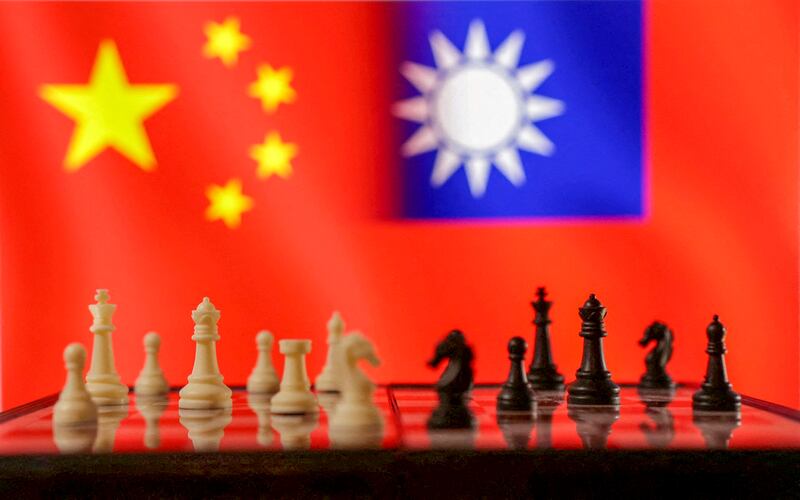Taiwan's national security chief says China is stepping up its infiltration of the democratic island, amid an ongoing investigation into reports that a journalist from Beijing’s Xinhua news agency played a key role in editing a political talk show at a Taiwanese broadcaster.
National Security Bureau Director-General Tsai Ming-yen told lawmakers on Thursday that Beijing is taking advantage of Taiwan's free, open and democratic society to step up its efforts to infiltrate the island, undermine its armed forces and sway the political views of its 23 million people.
"The number of cases [we are investigating] has increased significantly compared with previous years," Tsai told the island's Legislative Yuan. "The Chinese Communist Party's infiltration activities are increasingly rampant in Taiwan, posing a severe challenge to national security work."
Taiwan is currently ruled as the Republic of China, a sovereign state formed in 1911 after the fall of the Qing Dynasty, and whose Kuomintang government fled to the island after losing a civil war with Mao Zedong's communists in 1949.

Taiwanese law bans the island's people or organizations from engaging in any form of cooperation with the Chinese Communist Party, the mainland Chinese government or military that could involve political influence or harm its interests, and the majority of people have no wish to submit to Chinese rule.
While Beijing has never ruled out a military invasion to enforce its territorial claim on Taiwan, it has more recently vowed to achieve " peaceful unification" with the island through propaganda and other forms of pressure.
Investigations into spying
Tsai said agents of the Chinese state have stepped up intelligence gathering and espionage, infiltrating organizations, stealing technological secrets and influencing elections in recent months.
He said his bureau has investigated 84 cases of Chinese activities during the past year, 39 of which have led to prosecutions.
Agents and supporters of the Chinese state recruit more like them by putting pressure on people to sign "oaths of allegiance" to Beijing, with the armed forces a particular target for espionage, Tsai said.
RELATED STORIES
[ Taiwan probes reports of direct Chinese influence at TV stationOpens in new window ]
[ Chinese agents highly active in democratic Taiwan, dissidents sayOpens in new window ]
[ China-backed hackers step up spying on Taiwan: security firmOpens in new window ]
They spy on unofficial credit networks, pawnbrokers and loan sharks to figure out which military personnel are in debt, then use that as leverage for secrets, he said.
"They also recruit retired national security personnel and infiltrate political parties and government departments," Tsai said.
There is also funding for such "United Front" activities, although it typically comes from a broad network of pro-China organizations and individuals rather than directly from China, he said, calling the arrangement a "red supply chain."
China also infiltrates sensitive industries in Taiwan in a bid to steal advanced technology and commercial secrets, Tsai told lawmakers, adding that the island's academics and industry experts are often offered incentives to take their research to China instead.
Michael Chen, Director-General of Taiwan’s Ministry of Justice Investigation Bureau, also commented in the same session that the U.S.-China trade war and technology war have triggered a restructuring of the global supply chain, which is driving much of the industrial espionage from Beijing.
Xinhua influence?
Tsai's report to lawmakers comes amid an ongoing investigation into a newspaper report that a journalist from China's state news agency Xinhua was closely involved in editing a political talk show at a Taiwanese TV station.
The island's Liberty Times reported on June 24 that officials from China's Taiwan Affairs Office had approached several Taiwanese TV stations since the beginning of this year with proposals to start new political talk shows in exchange for preferential commercial treatment in the Chinese market.
Only one accepted, the paper said, adding that Xinhua journalist Zhao Bo took part in all discussions about the show's content, and showed up at the studio as the first episode was being recorded to ensure all the guests followed the agreed scripts.
Zhao also had private conversations with the guests at which she made clear exactly which angles she wanted emphasized, the report said.
But investigations have been hampered by the lack of a whistleblower, and the fact that Zhao is no longer in Taiwan, officials said on Thursday.
"We currently have no specific evidence, and no whistleblower," National Communications Commission deputy chief Weng Po-tsung told lawmakers.
And Liang Wen-chieh, Deputy Minister of Taiwan's government agency in charge of Chinese affairs, the Mainland Affairs Council, declined to comment when asked by RFA Cantonese why officials had been unable to find anyone to testify in the probe.
"We have asked everyone that we should ask," Liang said cryptically, before declining further comment, saying only lawmakers should be asking such questions.
Lo Chih-chiang, a lawmaker with the pro-China Kuomintang, dismissed the Liberty Times report as "fake news" that had been endorsed by the ruling Democratic Progressive Party.
Translated by Luisetta Mudie. Edited by Malcolm Foster.
